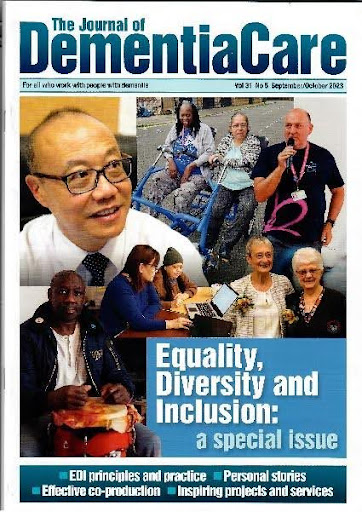Equality, Diversity and Inclusion: Dementia Community’s EDI group undertakes and promotes EDI initiatives
Williamson et al (2025) Equality, Diversity and Inclusion: Dementia Community’s EDI group undertakes and promotes EDI initiatives. Journal of Dementia Care 33(4) 24-26.
The principles and practice of equality, diversity and inclusion (EDI) are extremely relevant to the field of dementia. Toby Williamson (below) and other members of Dementia Community’s EDI group describe the group’s recent work for Dementia Community and the dementia sector more widely.

Issues involving equality, diversity and inclusion (EDI) are central to dementia care, as well as in the work of Dementia Community. EDI is about ens uring equitable access to dementia care and support, recognising and responding appropriately to the different effects that dementia has on people living with the condition from diverse communities, and their different needs. EDI is also about making sure that people with dementia do not experience discrimination or exclusion because of their diagnosis.
The UK’s Equality Act 2010 provides a legal framework for EDI by reminding us that people affected by dementia have rights. The Act aims to protect people from discrimination and exclusion on the grounds of their characteristics such as age, gender, race and ethnicity, sexu al orientation or disability (‘protected characteristics’). Under the Act, dementia can be considered to be a disability.In 2023 a special edition of the Journal of Dementia Care (Vol 31 No 5, September/October 2023) was entirely devoted to EDI. It explored the principles of EDI, provided guidelines for dementia care organisation s explaining how to implement EDI, and gave some excellent examples of EDI in practice involving people affected by dementia. You can access the edition for free via a link on the home page of our website: www.journalofdementiacare.co.uk. This special issue was put together by Lucy Whitman and other members of Dementia Community’s EDI group.
The work of the EDI group
The group was formed in 2022 by people associated with JDC and Dementia Community from a variety of backgrounds. The group aims to raise awareness of the importance of EDI across the dementia sector and ensure that EDI permeates all the work of Dementia Community. This includes issues of intersectionality; recognising that personalised dementia care needs to take into account individuals’ multiple demographic characteristics, and how this can lead to people experiencing several forms of exclusion and discrimination.
Summary
The principles and practice associated with equality, diversity and inclusion (EDI) are essential to good quality dementia care, despite recent political attacks on EDI initiatives. This article describes the work of Dementia Community’s EDI group in promoting an awareness of EDI in the dementia sector, and features contributions from several members of the group to demonstrate its diversity and different perspectives.

The group was boosted by several EDI-focused sessions at the UK Dementia Congress in 2022, which were well attended by people wanting to share relevant experiences, and know more about EDI and how to put it into practice. Since then, the group has been meeting regularly, every two months, online. The group is free to join for members of Dementia Community. Most people do this work in their own time and it is largely self-supporting, so members need to be willing to actively help. The group has shared principles and Terms of Reference and its membership reflects diverse communities affected by dementia.
As well as putting together the special edition of JDC, the EDI group has been active in trying to ensure that EDI continues to feature regularly in the journal. This has involved encouraging articles about EDI initiatives in dementia, and asking that authors include EDI considerations when submitting more generic articles. Similarly, the group has kept a focus on EDI at the UK Dementia Congress, through an expectation that proposals for presentations include reference to EDI. This could include for example, work specifically focused on diverse communities affected by dementia, active involvement of people with dementia, challenging stigma and discrimination, or reference to the rights of people with dementia. The group has also been developing an EDI framework for Dementia Community that will be publicly available via the website to show Dementia Community’s commitment to the principles and practice of EDI.
Toby Williamson is an independent health and social care consultant, and editor designate of the Journal of Dementia Care. John Bond is a PhD Researcher and Postgraduate Representative for Dementia and Ageing in the School of Social Science at the University of Stirling.
Dr Chris Knifton is Associate Professor in Neurocognitive and Neurodevelopmental Education in the School of Nursing and Midwifery at De Montfort University, Leicester.
Dr Jennifer NW Lim is a Reader in Health Inequalities and Behavioural Science in the Faculty of Education, Health, and Wellbeing at the University of Wolverhampton.
Jude Sweeting is a Director of Dementia Community, and chair of two dementia organisations, Resonate Arts and Dementia Pathfinders.
Key Points
- The principles and practice of equality, diversity and inclusion (EDI) are central to good quality dementia care.
- Stigma and exclusion experienced by people living with dementia means that EDI can apply to anyone with the condition as well as people with dementia from diverse and minority communities.
- EDI is supported by the UK’s Equality Act 2010 that prohibits discrimination based on aspects of people’s identity (‘protected characteristics’) such as gender, race and ethnicity, age, sexual orientation, and disability.
- Everyone has multiple characteristics and this can lead to some people experiencing several forms of discrimination or exclusion. This is known as ‘intersectionality’.
- Dementia Community has an EDI Group which is committed to promoting EDI in the organisation and dementia care more widely. People are welcome to join the group to support that commitment.
- The EDI Group has a set of shared principles and its membership reflects diverse communities affected by dementia.
- The EDI Group has successfully undertaken several pieces of work including producing a free, special EDI edition of the Journal of Dementia Care in 2023.
Challenges
Unfortunately there has been a backlash against EDI, most notably in the USA under President Trump, but also in the UK, with crude misrepresentations and derogatory comments about “wokeism”. Some EDI initiatives have also been seen as tokenistic, and other terms are being used to denote EDI, such as “belonging”. In the face of these challenges, and irrespective of terminology, Dementia Community’s EDI group believes it all the more essential to promote the importance of EDI and its benefits and relevance to dementia care. And in the spirit of EDI, to reflect the diverse but interconnecting perspectives of the EDI group, the rest of this article consists of contributions from members of the group.
If you are interested in finding out more or joining the EDI group, please contact info@dementiapublishing.community
John Bond – PhD Researcher & Postgraduate Representative (Dementia and Ageing, University of Stirling)

I joined Dementia Community’s EDI Group because my personal and professional journey has shown me how urgently we need more inclusive, representative dementia care. As Director of the LGBTQ+ Dementia Advisory Group, a dementia researcher, a former care professional, and a former unpaid carer, I’ve seen first hand how identity shapes experience – not just of dementia itself, but of the care, support, and systems surrounding it.
Too often, people from under-represented communities are left out of conversations and decisions that directly affect them. This is particularly true for LGBTQ+ individuals living with dementia, whose needs can be misunderstood, overlooked, or dismissed. Through my work, I’ve been advocating for environments where people can live and age authentically, safely, and with dignity.
Joining the EDI group felt like a natural extension of that advocacy. I want to help ensure that equity, diversity, and inclusion are not just discussed, but embedded in practice – within the pages of the Journal of Dementia Care, in policy, and across services. The Journal plays a key role in shaping perspectives, and it must reflect the full richness and complexity of the communities it serves.
This work is about justice, visibility, and change. It’s about making sure every person affected by dementia – regardless of who they are – has their voice heard and their needs met.
Dr Chris Knifton – Associate Professor in Neurocognitive and Neurodevelopmental Education, De Montfort University, Leicester

As the newest member of the EDI group, I come with a particular interest in supporting greater neurodiversity awareness across the dementia community and to shine a light onto areas of under-representation, such as childhood dementia.
In light of the former, I am open about my own neurodivergence – autism, while also taking time to consider other forms of neurodiversity and its impact on a person’s lived experience in dementia. One example can be information-giving for carers (both formal and informal), and how we can better incorporate reasonable adjustments to make information-sharing and support more accessible. I also encourage a broader narrative that, as a neurodivergent community, we also have a lot to offer. We are not just “victims” of our neurodivergences but have strengths too (neurodiverse-ability) that can be used positively to embrace our carer-capabilities-capital within the dementia space.
Regarding the second point I mention above, childhood dementia, it reminds us too that dementia is a large community of practice, but some communities are at risk of being marginalised and not seen. Childhood dementia is estimated by the Childhood Dementia Initiative to affect 700,000 children and young people worldwide and causes 204 deaths in the UK every year, a figure comparable to the 260 deaths annually from childhood cancer. Think for example, when did you last attend a conference or read an article that looked at childhood dementia? For our student and professional audience, was childhood dementia ever discussed in your dementia lectures?
Having voice, facilitating dialogue and sharing experiences (not just challenges but also strengths) remain core to our dementia community. This is notably enhanced through the EDI group, and has created a safe space to embrace our collective EDI commitment.
Dr Jennifer NW Lim – Reader in Health Inequalities and Behavioural Science, University of Wolverhampton

Dementia Community’s EDI group was established in 2022 to promote equitable dementia care for marginalised communities in the UK. As a researcher of Chinese heritage, I joined the group to advocate for the dementia-related needs of the UK’s Chinese population and to highlight the cultural, linguistic, and socioeconomic diversity of that population.
Despite being one of the UK’s largest ethnic minority groups – with a population of over 600,000 – the Chinese community remains severely under-represented in dementia research. When the Chinese community is included in studies, research often relies on small, localised samples near academic institutions, overlooking and failing to recognise the needs and experiences of the widely dispersed majority. Additionally, the community’s rich diversity – rooted in varied migration histories and places of origins – is frequently overlooked. Having led the first nationwide dementia intervention aimed at prevention across six cities in England and Wales for the Chinese community, and conducted research into dementia awareness within this population, I am committed to raising the visibility of this overlooked population, in both research and policy through the work of the EDI group.
Jude Sweeting – Director of Dementia Community, Chair of Resonate Arts and Dementia Pathfinders

My interest in the Dementia Community EDI Group is rooted in over 30 years of experience as a woman working in various roles in dementia health and social care, and in my personal journey caring for my parents, who both lived with dementia between 1995 and 2003. These experiences showed me how inequality – like water to a fish, unseen but ever-present – shapes the experience of both living with and caring for someone with dementia, especially where protected characteristics intersect. Gender profoundly shapes this landscape but is often overlooked. Dementia disproportionately affects women – not only are they more likely to live with the condition, they also make up the majority of unpaid carers (and paid carers), often at great cost to their health, financial wellbeing, and independence.
Attending the 2022 UK Dementia Congress refreshed my thinking. I was struck by something Ronald Amanze, who lives with dementia, said to a room mainly full of professionals: “You don’t listen!”. It made me realise, emotionally rather than intellectually, that many people are still not within earshot. That uncomfortable moment reshaped my approach: I asked for help, and I was immediately and effectively assisted by a member of the EDI group. Since then, at Resonate Arts, I’ve been working differently to embed EDI through small yet bolder steps – within the limits and possibilities of a small charity in a very diverse inner-city community.
To the EDI group I bring lived experience, a commitment to collaborate, and a deep belief that equity must guide all Dementia Community Board decisions – it’s a unique force driving the learning and sharing needed for the inclusive community we all deserve.
